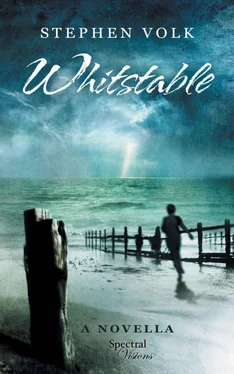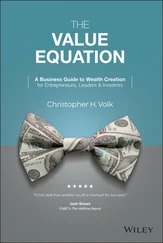Which was as much as Cushing needed to hear. He stood up and shook the man’s hand generously in both of his.
“Thank you so much.”
“Don’t do it.” The detective flicked ash into a metallic waste paper bin. “You don’t want to be associated with that kind of rubbish.”
“Perhaps not.” One side of his mouth twitched. “I’ll consider my various options. Definitely. Thank you, Derek.”
Out in the corridor with the sound of a clattering typewriter nearby and garrulous laughter slightly more distant and out of sight, the old man heard from behind him:
“Peter, do you mind if we have a quick word? On an unrelated matter?”
It felt like a cold hand on his shoulder, which was absurd. Two uniformed constables passed him, a man and a woman. They both smiled, as if they recognised him. He touched the rim of his hat.
Smiling, he turned to see Wake leaning against the jamb of the doorway to the interview room, not smiling at all. The policeman switched off the light, closed the door and walked past him up the corridor in the direction of the sergeant’s desk, then turned into a glass-sided office and sat behind a desk with several bulging manila files on it which he arranged in piles of roughly equal height.
When Cushing had stepped reluctantly into his office he stood up again, flattened his tie against his shirt front with the palm of his hand, and crossed the room to shut the door after him. The conversation and clacking of the typewriter became substantially quieter. Wake returned to his swivel chair.
“A man came in this morning and made a complaint about you.”
“Oh?” He told himself not to betray anything in his expression. Certainly not shock, though that was what he was feeling. Now the reason for Wake’s mood was all too clear. “May I ask who?”
“I’m not at liberty to say. I told him I’d prefer not to, but if he wanted to make it official, I’d make it official. But he was reluctant.”
“I’ll bet he was.” Under his breath.
Had he heard? Wake’s buttons really were straining across his midriff. “He was doing you a favour. He doesn’t want to cause any trouble.”
“What exactly did he say, Derek? Are you allowed to tell me that? Officially or unofficially?”
“He said you were talking to his little boy.”
“That’s absolutely correct. I was. I won’t deny that. What’s wrong with that?”
“Let’s just say he doesn’t want it.” The way he lounged back in the chair was beginning to annoy Cushing. He found it louche, oikish and disrespectful. And the man’s fly zip was distressingly taut.
“I chat to all the children. You know that. They chat to me. I’m like the Pied Piper. Helen and I…”
“I know. I know.” Wake leant forward, elbows on the desk. Pushed the harshness of the angle-poise lamp away. “Listen, it puts me in a very awkward position. When someone comes in with a complaint like this. I don’t want it to go any further if I can help it.”
“On my part?”
“On anybody’s part.”
Cushing could feel his lips tight and bloodless with rage and dared not speak for fear of what might come out. So, he’s got his retaliation in first, he was thinking. Clever. Before I could make any accusations, he’s made his.
Clever man.
Clever monster.
“Look, I know this feller. He’s a hell of a nice bloke.” Wake raked his hair with his fingers and offered his palms. “We went to school together. I’ve got drunk with him. He’s not a troublemaker, not like some round here. He’s got a decent job, down on the boats. My wife knows his family, has done for donkey’s years. He visits his mum in the nursing home every Sunday. He helps out at Christmas, with the food and that.”
“In other words, you believe him.”
“I think things can be misinterpreted, that’s all,” Wake said. “And he has, probably. I don’t mean ‘probably’.”
Cushing didn’t think he could remember such anger building up inside him. It was white hot and it terrified him and he knew if it rose much more he wouldn’t be able to control it, and that would be a disaster. He opened the door.
“Thank you so much. I think I’ll go now, if you don’t mind. Unless you have anything more to say to me.”
Wake sighed and rubbed his eyes.
When he looked up to reply, Cushing was gone. Wake sprang up, grabbed the closing door of his office, yanked it back wide and hurried to the sergeant’s desk in pursuit of the long dark coat. Remarkably, the older man was out-striding him and he had to break into a run to catch up.
“Peter. Let me drive you home.”
“No, Derek. Thank you all the same. I think I’d prefer some nice fresh sea air. Good day to you.”
The detective followed him outside, caught up with him a second time and stood in front of him on the pavement, this time blocking his way.
“Look, all I’m suggesting to both of you is keep a wide berth from each other. You, and Gledhill and his family. Both parties. Either that, or sort out your differences without the police getting involved.”
“I’m sure we shall,” Cushing said, circumnavigating him.
* * *
The scenario had changed radically. The script had been rewritten, drastically. Now at least he knew with some certainty that he daren’t rely on the police or the legal system. His adversary had prepared the ground, cleverly sown the seeds of doubt in a pre-emptive strike against him. If he made an accusation now it was too risky he would be disbelieved and, worse, far worse, the boy would be disbelieved—if the boy even spoke up at all. There was no guarantee he would do so, given his only way of dealing with the situation, it seemed, was through the prism of monsters and monster-hunters. Wasn’t it Van Helsing who said “The Devil’s best trick is that people don’t believe he exists”? In Bram Stoker’s novel, he thought, but certainly in the play and Universal film. He remembered the Van Helsing of the book: a little old man who literally talked double Dutch. He remembered asking Jimmy Carreras why he didn’t cast a double-Dutchman in the part, and Jimmy saying: “We rather think you should play him as yourself”. But the point was, how should he play this part, now? He had to stop this man. Alone, if need be. And he needed ammunition. In the words of Inspector Wake, he needed evidence .
Without delay he resolved to visit the Fount of All Knowledge.
She was wrapping up a cucumber in newspaper for a customer with whom she was conversing breathlessly. Through a steady stream of clients like this one she gleaned her vital information. A round-faced woman with the general shape of the Willendorf Venus and the given name of Betty, she knew everything to know about everyone in town: even a good deal they didn’t know about themselves, he suspected. When Helen and he came to buy fresh vegetables from her and her husband’s shop, they invariably came away a little wiser about something of high import, locally. In the woman’s opinion, anyway. Which is why Helen had coined her nickname: ‘The Fount of All Knowledge’, and it had stuck. A private joke between Peter and his wife. A private look between them as she twirled a bag of tomatoes at the corners whilst dispensing the latest gossip. A private raised eyebrow. A private hand concealing a wry smile. It seemed so long ago, and only yesterday.
“Lovely morning.”
“Hello, Mr C. Yes it is.” She wiped the dry earth from her hands to her apron. “The sun’s done us proud. For February.”
“I should like one of these, please.”
The Fount of All Knowledge took the cabbage from his hands and popped it into a brown paper bag tugged from a butcher’s hook. The tiny stigma in the corner torn.
Читать дальше












